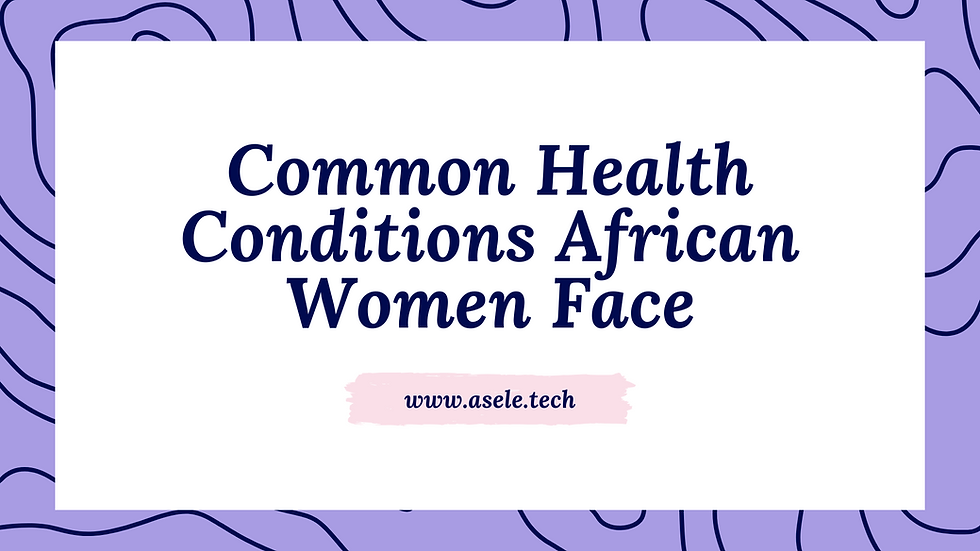Health Conditions African Women Face Most & How to Take Action
- Asele Team
- Aug 10
- 3 min read

African women, both across the continent and in the diaspora, face unique health risks that often go unnoticed until they become serious. Many of these conditions can be detected early, managed better, or even prevented with the right information and tools.
This post breaks down some of the most common health challenges, why they affect African women more, and most importantly, what you can do to protect yourself.
1. Cardiovascular Disease, Diabetes, and Obesity
The risk: Black women face the highest rates of high blood pressure worldwide, and nearly 45 % of African women will be overweight or obese by 2030. This combination significantly increases the risk of heart disease, stroke, and type 2 diabetes.
Why it happens: Urban lifestyles, processed foods, lack of safe exercise spaces, stress, and genetics all play a role.
2. Breast and Cervical Cancer
The risk: African and Black women are more likely to die from breast cancer than women from other backgrounds. Cervical cancer remains one of the top causes of cancer deaths among women in Africa.
Why it happens: Limited access to regular screenings, late diagnosis, and inequities in treatment options.
3. Uterine Fibroids
The risk: Black women are up to three times more likely to develop fibroids than women of other ethnicities. These benign growths can cause severe pain, heavy bleeding, and fertility challenges.
Why it happens: Genetics play a major role, but diet, vitamin D deficiency, and reproductive history may also contribute.
4. Sickle Cell Disease & Kidney Conditions
The risk: Sickle cell disease is most common in Sub-Saharan Africa, and certain genetic variants put African women at higher risk for kidney disease.
Why it happens: Inherited genes that historically protected against malaria also increase these risks.
5. Maternal Health Challenges
The risk: Women in parts of Africa still face high rates of maternal death, obstetric fistula, and pregnancy-related complications.
Why it happens: Lack of prenatal care, limited access to skilled birth attendants, and unsafe delivery conditions.
6. HIV and Other Infections
The risk: African women face higher rates of HIV infection, often linked to gender inequalities, lack of access to preventive services, and unsafe cultural practices.
Why it happens: Gaps in sexual health education, stigma, and limited access to testing and prevention tools.
How You Can Take Action
Cardiovascular Disease & Diabetes
Ask your doctor how often you should check your blood pressure, cholesterol, and blood sugar.
Track your results in the Asele app and set reminders for your next check-up.
Breast and Cervical Cancer
Book your Pap smear and mammogram as recommended for your age and risk level.
Store your screening dates in the Asele app so you never forget.
Uterine Fibroids
If you notice heavy bleeding, severe cramps, or pelvic pain, request an ultrasound.
Log your symptoms in the Asele app to share with your doctor.
Sickle Cell & Kidney Conditions
Ask your healthcare provider about genetic testing, especially before pregnancy.
Keep your test results saved in the app for easy access.
Maternal Health
Register for prenatal care early in pregnancy.
Use the app to track appointments and important advice in the journal.
HIV & Other Infections
Get tested regularly and talk openly with your partner(s) about testing.
You can keep a private record of your test history.
Why This Matters
Many African women are never told about these risks or the simple steps they can take to reduce them until it’s too late. The earlier you take action, the more options you have for care, prevention, and better health outcomes.
Join the Asele Community
At Asele, we believe every African woman deserves access to preventive care knowledge and tools that fit her life. Whether you’re in Lagos, Nairobi, London, or Atlanta, our app helps you track your health, set reminders, and connect with a community of women who are putting their health first.
Check out the Asele app today and start taking charge of your health, because prevention isn’t just better than cure, it’s life-saving.



Comments